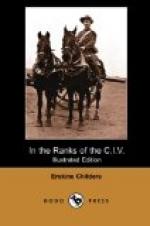There is a rumour that a Boer patrol has been sighted, and a prisoner captured. I believe there is no doubt that De Wet and his force are between us and Lindley, and will have a shot at this convoy. We were warned that we might be attacked to-night. At dark we bivouacked, and, soon after, our right section, under the Major, whom we parted from at Kroonstadt, marched in. They had been sent out with a relief column to Honing Spruit, where a train had been attacked and the troops in it hard pressed. The Boers cleared off just before the Battery came up, which then had followed and overtaken us. Another bothersome hunt after water for the horses in the dark. All we could find was a stagnant pool, which ought to poison those that drank of it. Some more troops also joined the column. Colonel Brookfield (M.P.) is in command of the whole force.
June 25—(My birthday).—Up at 4.15 A.M. Off at 5.15, as part of the advance guard of the column, the Bushmen and Yeomanry scouting far ahead, and the infantry on either flank in a widely extended line. We all admired the steady regularity of their marching, heavily weighted as they were. Our own gunners also have a good deal of walking to do. “Dismount the detachment” is the order at all up-grades, and at difficult bits of the road. Drivers dismount at every halt, however short, but on the move are always safe in the saddle. We marched over the same undulating land, with occasional drifts and spruits, which are very hard on the horses. The convoy behind looked like a long sinuous serpent. Watered at seven at a farm. Williams was sent out to forage, and bought a sheep for 15s., chickens at 1s. 6d., and a turkey. Gunners were sent out to pillage a maize field. Then we marched on some miles to the top of a steep ridge looking down upon a lower plain, the road crossing a deep ravine at the bottom by a big steel bridge. We took up a commanding position at the top, overlooking the bridge, so as to cover the convoy while it descended and crossed. An attack seems likely,—a curious birthday treat!—4 P.M.—Nothing has happened. An interminable procession of ox and mule-waggons files down the pass; it is a much larger convoy than I thought, and must have received additions since we started. At this rate we shall be ages getting to Lindley.
One no longer wonders at the slowness of an army’s movement out here. The standard of speed is the trek-ox, lurching pensively along under his yoke, very exacting about his mealtimes, and with no high notions about supreme efforts, when he has to get his waggon out of a bad drift. He often prefers to die, and while he is making up his ponderous mind he may be blocking up a column, miles in length, of other waggons in single file. We talk of the superior mobility of the Boers; but it puzzles me to know how they got it, for oxen and mules are their standards of speed too, I suppose.
At dark, when all had passed, we followed ourselves down an abominably dangerous road, and over the bridge to camp, which looked and sounded like a big busy town, scintillating with fires and resonant with the yells of black drivers packing their waggons.




